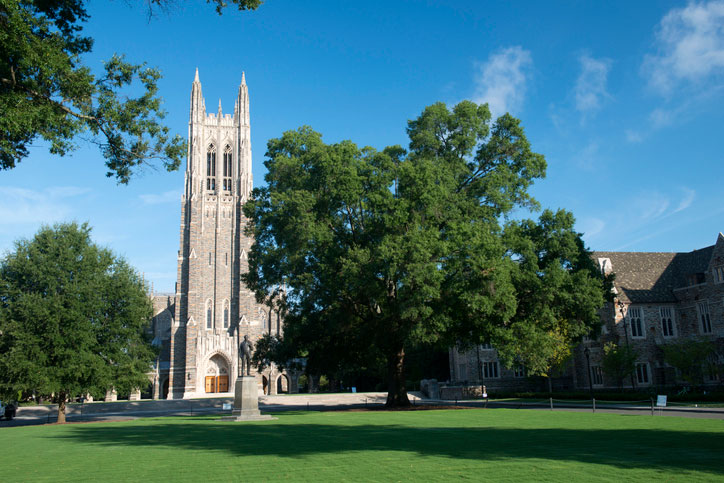Written by Helen Lewis

Durham, North Carolina is the fourth-most populous city in the Tar Heel State. Home of Duke University, the Bull Durham Blues Festival, and the legendary singer Roberta Flack, Durham is a diverse and fast-growing region.
Social workers in this part of the United States can expect to earn a comfortable living, though the exact figures can vary based on specialization and level of experience.
The following post will explore the path to becoming a social worker in Durham, NC, from an overview of potential jobs to Master’s in Social Work (MSW) degrees, licensure, internships, and finally, a summary of salary ranges in the Durham-Chapel Hill metropolitan area, which can get as high as $103,540.
What Types of Social Work Are There in Durham, NC?
Whether in schools, hospitals, prisons, or government buildings, social workers provide a wide range of essential services to communities in need.
But what might your official title be as a social worker? Below is a non-exhaustive list of potential employment opportunities that may exist in the social work field in Durham, North Carolina, including:
- Clinical Social Worker: A clinical social worker provides therapy and counseling to individuals, families, and groups to help them manage mental health issues, emotional challenges, and behavioral problems.
- Medical Social Worker: A medical social worker supports patients and their families in healthcare settings by addressing emotional, social, and financial challenges related to medical conditions.
- School Social Worker: A school social worker helps students at every level of education (elementary, middle, high schools; colleges and universities) overcome social, emotional, and behavioral issues to improve their academic performance and overall well-being.
- Child and Family Social Worker: A child and family social worker provides support and services to keep children safe, assist families in crisis, and promote family well-being and stability. These employees can have roles in Child Protective Services (CPS), adoption or foster care services, or in domestic violence support services.
- Community Social Worker: A community social worker works to improve the well-being of individuals and communities by connecting them to resources, advocating for social change, and organizing community programs. Official titles in this field can include Community Organizer, Community Outreach Worker, Housing Services Social Worker, or Community Health Worker.
- Geriatric Social Worker: A geriatric social worker assists elderly individuals and their families by addressing aging-related challenges and coordinating care and support services. In this field, employees can work in settings like long-term care, hospices, hospitals, senior centers, and veterans’ homes.
- Military Social Worker: A military social worker provides mental health support and social services to military personnel, veterans, and their families, addressing unique challenges related to military service. Roles in this capacity could be along the lines of a Veterans Affairs Social Worker, an Active Duty Military Social Worker, or a Family Readiness Social Worker.
- Criminal Justice Social Worker: A criminal justice social worker supports individuals involved in the criminal justice system by providing rehabilitation, counseling, and advocacy to promote their successful reintegration into society. This work can include positions like Probation Officer, Parole Officer, Court-Appointed Social Worker, or Correctional Facility Social Worker.
- Policy and Advocacy Social Worker: A policy and advocacy social worker influences social policies and legislation to promote systemic change and address social justice issues affecting vulnerable populations. Possible titles in this field are Policy Analyst, Lobbyist, Legislative Aide, and Nonprofit Program Manager.
- Administrative Social Worker: An administrative social worker oversees programs, manages resources, and coordinates services within social service agencies to ensure efficient and effective delivery of support to clients. Jobs like Social Work Supervisor, Program Director, Agency Administrator, or Executive Director of a Social Services Agency could fall under this umbrella – and, as you might imagine, such roles suggest potential for mobility to more senior-level positions, which can come with higher salaries.
- Research Social Worker: A research social worker conducts studies and evaluates programs to advance understanding of social issues and improve interventions and services for diverse populations. This work can exist in a range of contexts, including in academic settings and in non-profits (i.e., grant writing).
- Specialized Social Worker: A specialized social worker focuses on addressing specific needs or populations, such as LGBTQ+ individuals, people with disabilities, or those affected by trauma, providing tailored support and advocacy.
- Employment and Career Social Worker: An employment and career social worker assists individuals in finding and maintaining employment by offering counseling, skills training, and connecting them with job opportunities. Social workers in this field could find work in settings like government job training centers, nonprofit vocational rehabilitation agencies, educational career counseling offices, and private sector human resources departments.
- Environmental Social Worker: Environmental social workers focus on addressing social justice issues related to environmental concerns, advocating for sustainable practices and supporting communities affected by environmental degradation. These professionals may find employment in settings such as environmental justice organizations, government agencies responsible for environmental policy and regulation, community development organizations focusing on sustainability, or international non-profits addressing global environmental issues.
As you can see, social work takes many forms, and can often be interdisciplinary. That means that there are a number of entry points for prospective employees with a huge range of skills.
No matter what your innate skills are, social work is a field that allows workers to find their niche in a deeply meaningful way. Whether you’re drawn to direct patient care, policy work, or community outreach, there’s a place for everyone. The diverse job landscape ensures that social workers can not only find a position that aligns with their passions and skills but also continue to grow and make a significant impact in their community.
Getting an Advanced Degree: MSW Programs in North Carolina

Just like in any field, different social work jobs come with different requirements. Not every position means that you need to have advanced degrees, like a bachelor’s or master’s in social work. However, you’ll probably need at least an Associate’s or Bachelor’s degree from an accredited school.
One of the best-known and most competitive universities in Durham, North Carolina is Duke University, a private research institution containing 10 schools and colleges. Duke itself does not offer a standalone MSW program, but it does have a dual-degree program where you can earn a Master of Divinity (M.Div.) from Duke and a Master of Social Work (MSW) from the University of North Carolina at Chapel Hill (UNC). This degree program combines theological education with advanced social work training, preparing students for leadership roles in various social and community services.
Students pursuing this path can complete both M.Div. and MSW degrees in four continuous years, instead of the usual five, making it a time-efficient option for those interested in integrating their social work practice with theological and spiritual care. For more information, you can explore the details on the Duke Divinity School’s website and UNC’s School of Social Work site.
What Is Accreditation?
Accreditation means that a school or program has been officially recognized and approved by a reputable organization. It’s like a stamp of approval that shows the school meets certain quality standards. When you get a degree from an accredited institution, it means you’ve received an education that employers can trust. If you choose to pursue any MSW degree – but particularly one that is online-only – be sure to do your research and ensure that your program is accredited by the Council Work on Social Education (CWSE). Without an accreditation, it’s possible that your degree will not be officially recognized. A non-accredited program may not offer you the level of high-quality education and experience that you are looking for.
While a Master’s in Social Work (MSW) isn’t always required, many organizations prefer candidates with education and experience in social work. In addition to having a leg up in your job search, an MSW equips you with thousands of hours of research and hands-on experience in this important and rewarding field.
One instance in which an MSW is necessary is in becoming a social worker in clinical settings like hospitals, rehabilitation clinics, and mental health facilities, which often requires becoming a Licensed Clinical Social Worker (LCSW). For more on licensure and finding employment as a social worker in North Carolina, see the sub-section “Is Licensure Necessary?”, below “Finding Employment as a Social Worker in Durham, NC.”
Finding an Internship in Social Work in Durham

In many cases, graduate programs in social work and licensure will require applicants to complete a designated amount of hours in fieldwork and/or internships. These placements can offer invaluable experience and professional networking opportunities, bridging the gap between the classroom and the real world.
In an MSW, internships typically require several hundred to over 1,000 hours of supervised fieldwork over the course of your program. These hands-on experiences are often split between the first and second years of your studies. In the first year, internships usually involve generalist practice, where you’ll get a broad foundation in core social work skills by working in settings like schools, community agencies, or healthcare facilities. You might be assisting with case management, conducting initial assessments, and learning the ropes of social work. In the second year, the focus shifts to specialized practice, allowing you to dive deeper into areas of interest such as clinical social work, child welfare, or medical social work. During this time, you’ll take on more complex cases, develop treatment plans, and provide direct therapy under supervision. These internships not only prepare you for your future career but are also essential for meeting the practical experience requirements needed for licensing exams, whether you’re aiming to become a Licensed Master Social Worker (LMSW) or a Licensed Clinical Social Worker (LCSW).
Finding Employment as a Social Worker in Durham, NC
Whether you’re interested in supporting veterans, getting involved in local government, or connecting children in need to safe, responsible foster families, there are plenty of opportunities to explore. One of the best ways to start your job search is by tapping into local resources like job boards specific to social work, networking events, and career fairs hosted by organizations and universities in the area. Websites like LinkedIn and professional associations such as the National Association of Social Workers (NASW) often list job openings and provide valuable networking opportunities. Additionally, reaching out directly to local agencies, hospitals, schools, and non-profit organizations can sometimes uncover hidden job opportunities that aren’t advertised widely.
Is Licensure Necessary?
While a license is not a requirement to becoming a social worker, obtaining a license significantly broadens your career prospects and is essential for some advanced roles. To practice as a Licensed Clinical Social Worker (LCSW) or a Licensed Master Social Worker (LMSW), you’ll need to have completed a Master’s in Social Work (MSW) from an accredited program, along with the required supervised clinical hours. (For more on accreditation, see the above sub-section, “What Is Accreditation?”, under the section “Getting An Advanced Degree: MSW Programs in North Carolina). These licenses are crucial for providing direct therapeutic services, conducting clinical assessments, and holding supervisory roles.
Licensure not only enhances your professional credibility but also ensures you meet the high standards of practice set by the North Carolina Social Work Certification and Licensure Board. This process involves passing the Association of Social Work Boards (ASWB) exam, which tests your knowledge and readiness for professional practice. In Durham, licensed social workers can work in diverse settings, including hospitals, schools, private practices, and community agencies. So, while it requires dedication and effort, obtaining your social work license in North Carolina opens doors to a fulfilling and impactful career, allowing you to make a real difference in the community.
Social Worker Salaries in Durham
According to the Bureau of Labor Statistics, there is a wide range in salaries for social workers, with employees in this field earning anywhere from $32,730 to $97,280 annually. In some fields, such as healthcare, social workers in Durham-Chapel Hill can earn over $100,000 a year.
The table below offers a glimpse into the range of salaries—from the bottom 10% of earners to the top 10% of earners—available to social workers in Durham across four categories. The final category, “Social Workers (All Other),” is broad enough that it may include such diverse positions as community organizers, homeless shelter workers, corrections social workers, grant writers, and crisis hotline counselors.
Social Work Specialty | 10% | 25% | 50% (Median) | 75% | 90% |
Child, Family, and School Social Workers | $39,390 | $47,620 | $51,530 | $63,380 | $72,540 |
Healthcare Social Workers | $56,100 | $65,640 | $67,250 | $84,900 | $85,790 |
Mental Health and Substance Abuse Social Workers | $37,180 | $45,440 | $54,880 | $63,050 | $71,990 |
Social Workers (All Other) | $47,190 | $71,990 | $86,280 | $93,580 | $103,540 |
Table data taken from 2023 BLS reports for the Durham-Chapel Hill metropolitan area.
2023 US Bureau of Labor Statistics job market trends and salary figures for child, family, and school social workers, healthcare social workers, mental health and substance abuse social workers, and social workers (all other) are based on national data, not school-specific information. Conditions in your area may vary. Data accessed June 2024.





